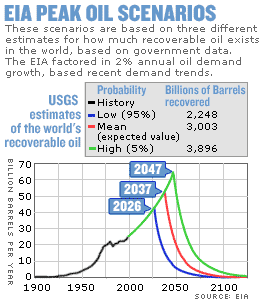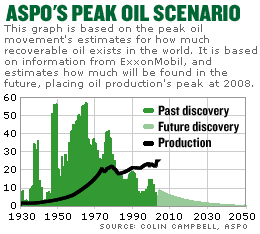NEW YORK (CNN/Money) -
The end of cheap oil may mean more than just higher gas prices for Americans. It may mean the end of the oil age as we know it.
That is according to the so-called peak-oil movement, which says that by 2008 humans will have extracted half of the earth's oil. In other words, we're using oil faster than we can ever hope to find it.
"We have all been enjoying the greatest party the world has ever seen: the great oil party," according to Kjell Aleklett, president of the Association for the Study of Peak Oil (ASPO) and a physics professor at Uppsala University in Sweden.
"After the climax comes the decline, when we have to sober up and face the fact that the party is coming to an end," he wrote in a paper earlier this year.
The hangover would mean not only the end of low oil prices, but also a slowdown in world economic growth. It could also lead to social and political unrest, as many countries try to keep the party going even as oil disappears.
People have been predicting the end of the oil age since the first oil well was drilled in the mid-19th century. But recent events -- especially light crude's recent jump above $50 a barrel -- have brought ASPO's 24 geologists, physicists and former oil-sector employees, into the spotlight.
More than 300 people attended ASPO's third workshop in Berlin last spring, including speakers from BP and ExxonMobil, two of the world's biggest oil companies.
That was up from 50 people at the first ASPO workshop in 2002. (Click here to read the ASPO, Uppsala University statement on oil depletion.)
Finite supplies
Even the U.S. government agrees that the amount of oil that can be pulled from the planet is finite. But it estimates that global oil production will likely peak in 2037, rather than in 2008.

"All or nearly all of the largest oil fields have already been discovered and are being produced. Production is, indeed, clearly past its peak in some of the most prolific basins," the federal Energy Information Administration (EIA) said in a recent report on peak oil.
"Over the last 20 years, the size of oil discoveries has fallen off dramatically. We are finding more fields than in the '60s and '70s, but they're much smaller," said Michael Rodgers, ex-oil geologist who is now senior director of PFC Energy, a nonpartisan energy consulting firm. "We're producing three barrels of oil for every one barrel of oil that we find."
PFC is more optimistic than ASPO, since PFC's experts believe new technology could keep us from running out of oil early.

Anxieties about running out of oil "patently are not frivolous, given the stark realities evident in many areas of the world," Alan Greenspan said in a speech in Washington, D.C., this October.
But Greenspan ultimately rejected the specter of oil reaching its peak, saying that technology will be able to ensure the oil supplies necessary, as long as technology has a "more supportive environment" -- meaning more money and government support.
Phil Flynn, analyst at Alaron Trading, agreed, noting high prices largely reflect turmoil in some oil-rich regions. Supply and production scares in places like Russia and Nigeria have boosted prices recently more than worries about the end of the oil age.
| Related stories
|

|
|
|
"Countries are always drilling and exploring for oil (despite political turmoil), because there is power in having oil," ASPO's Aleklett said in a recent interview.
"This takes us to the heart of a security issue," added Rodgers. "It is likely that OPEC can step in and meet demand if a peak in non-OPEC regions happens. But then we'll be even more dependent on parts of the world that aren't stable and reliable."
Beating the peak
Even if we don't run out of oil, the federal government admits it may become phenomenally expensive. "Will the world ever physically run out of crude oil? No, but only because it will eventually become very expensive in the absence of lower-cost alternatives," the EIA report said.
To avoid a peak oil crisis, analysts said more conservation will be needed, especially in the United States. Accounting for only 5 percent of the world population, America currently uses a quarter of the world's oil, according to the EIA.
"The U.S. government should consider the possibilities raised by the peak-oil people. We have to be prepared to deal with all plausible situations, and it has to be reflected in policy," said Rodgers.
No one from the Department of Energy was available to comment, but analysts agreed the peak movement's warnings have not been widely reflected in domestic energy policy. Most politicians will be loathe to tackle the issue, analysts said.
"People don't want to face this reality," said Rodgers. "Once you accept it as a possibility -- not even as a certainty, but just as one of many possible scenarios -- then you have to make all sorts of changes (in the way you live), because it would not make sense not to."

|

